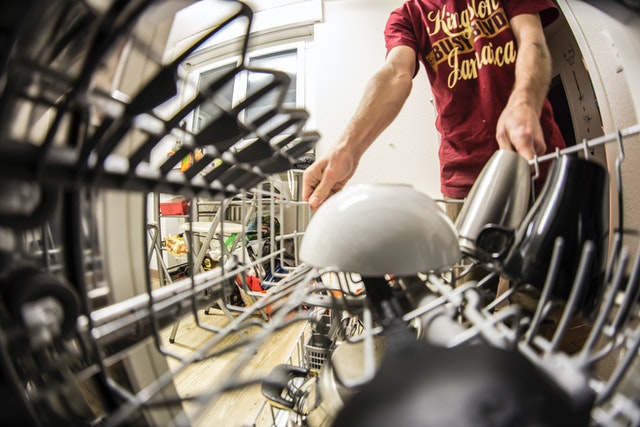Dishwashing is a routine task that every household performs. Everyone wants to complete the job fast and efficiently. By understanding the benefits of each method, you may choose which way to wash the dishes is most convenient for you.
A dishwasher is one of the common appliances in most households today. You may feel overwhelmed when looking for the best dishwasher in the market. Many manufacturers are high-quality with the best features. However, it’s not every day that your dishwasher functions correctly. You may encounter some signs that may lead to damage to the machine.
Today’s article discusses the common problems, solutions, and tips for your dishwasher not cleaning.
Potential Problems of Your Dishwasher
Dishwasher failing to clean properly is one of the most frequent complaints. As a result, you have to switch to hand washing your dishes when they break down, which can be inconvenient and time-consuming. The following are some possible causes of your dishwasher not cleaning:
- Your dishes consistently come out dirty.
- Your dishwasher has leaks.
- Your dishes don’t dry.
- Your dishwasher has foul smells.
- Your dishwasher won’t start.
- Your dishwasher doesn’t drain.
- Your dishwasher is making loud noises.
- Your powder dispenser is not working.
Diagnose and Resolved
In contrast to your other home equipment, your dishwasher will show precise indications to tell you what’s wrong. In addition, when your valuable appliance malfunctions, it’s a nightmare, and deciding whether to fix it or replace it is challenging.
However, it is essential to recognize and comprehend the fundamentals of dishwasher troubles. In addition, it will help you take preliminary actions before engaging a professional appliance maintenance specialist. The following are the most common diagnoses and solutions that any household can perform.
To Check for Running Water
Dishwashers use less water than handwashing, but they still need adequate water to clean your dishes. A simple diagnosis can be helpful for your dishwasher. First, it is to check for running water. For example, run the machine with empty cups, and place them on the top and bottom racks. Filled cups at the end of the cycle indicate that the machine is working correctly.
Examine the Drain
There should be no pooling water when your dishwasher is not in use. Instead, examine the drain; Pooled water indicates that your dishwasher is not emptying properly. Therefore, look and ensure the fill lines are straight and not kinked in any way so that the dishwasher can fill adequately. Next, examine the drain and inflow valves, float assembly, and door latch. Check for obstructions on the valve screens. In addition, remove trash from the dishwasher’s bottom if your machine has a filter. Also, scoop out any dirt at the dishwasher’s bottom.
Examine the Spray Arms for Blockages
To make sure the spray arms rotate smoothly, manually spin them. Ensure to remove anything that is blocking the spray arm’s path and manually turn them. If you are unfamiliar with the spray arm, the primary purpose is to jet hot water at high pressure and replace hand scrubbing when cleaning dishes. In addition, rinse your dishes thoroughly before loading them into the dishwasher to avoid future spray arm clogging.
Examine the Detergent Dispenser
During the cleaning cycle, the dispenser is supposed to put soap into the dishwasher. It has two sections: the sealed and the one unsealed. These are used for pre-washing and the primary wash cycle, respectively. It could also get clogged up with soap and other leftovers, making it stop working correctly. In addition, make sure the dispenser shuts tightly and is clean.
Improper Loading of Dishes
The loading of your dishes into the dishwasher correctly plays a vital role. Place containers equally to avoid stacking. Not everyone cares that there is a specific technique to load a dishwasher so that all the dinnerware and utensils will come out spotlessly clean. Additionally, it guarantees that the dishwasher won’t be damaged and can be utilized and operated for a long time.
What’s Next: Dishwasher Maintenance Tips
Perhaps you don’t mind doing the dishes by hand. However, when both partners work full-time, it is convenient to have a machine perform this task. Therefore, maintaining the performance of your dishwasher is essential to prevent any hassles. Here are some helpful tips for keeping your dishwasher.
- Make sure the dishwasher can handle any plastic dishes you want. But, of course, you need to check it first before using it with care. In other words, read the manual and understand its content.
- Cleaning your dishwasher on a consistent schedule will assist in getting rid of musty smells, removing grease and grime, and preventing soap buildup.
- Use a cleaner monthly to eliminate mineral deposits, scale buildup, and hard water stains.
- Do a vinegar rinse as a do-it-yourself fix. The procedure, a cup of white vinegar into the bottom of your empty dishwasher, choose the deep cleaning cycle and run the dishwasher at the highest temperature. You may do this every few months or as needed.
- If your machine doesn’t have a filter that cleans itself, you should remove the filters and rinse them with warm water and a soft brush if necessary.
- Make sure the machine is on a level surface to prevent leaks.
- To keep mold and mildew from growing on the seal, wipe it down regularly with a solution of vinegar and water.
- Do not move or tilt your dishwasher by holding on to its door.
- Ensure to dry out your dishwasher every after circle to prevent mold growth. Remember, moisture can build up inside and lead to mold development.
- By carefully placing your dishes in the dishwasher, you can prevent rusty dishwasher racks and increase their lifespan.
- Do not replace liquid detergents intended for hand dishwashing. They will produce excessive suds, which may leak all over your kitchen floor.
- Ensure to set the temperature right to avoid any unwanted situation. For example, for heavy-duty dishes, you need high heat to clean them. On the other hand, 130 F saves energy at low temperatures and is best for lighter loads and glassware. Also, 150 F or higher should heat for pots and pans.
- Don’t use your dishwasher for your favorite Chinawares and utensils. It might rust gold trim, chip crystal, harm fine knives, and tarnish copper.
Find an Appliance Pros Near You
A dishwasher provides many benefits and is an essential appliance in every household. You can keep your dishwasher in excellent condition with tender loving care. However, contact your reliable and trusted local appliance repair company if there is a more severe issue, such as a dishwasher that won’t start or doesn’t empty.
Appliance repair service is skilled and professional with complete knowledge of different modern appliances. They can work with various home appliances, diagnose, and provide honest recommendations or solutions. In addition, finding an appliance repair company that works based on your requirements and budget is critical.
The Bottom Line
A dishwashing machine that doesn’t clean dishes is a headache, especially for busy households. Check your dishwasher’s door gasket, sprayer arms, strain screen, and other components for food crumbs, grease, and other debris. It is vital to check to see if it helps by running a cleaning cycle with dishwasher cleaner and no dishes.
It is wise to follow the suggestions above to minimize future dishwashing damage and keep your dishes spotless. It may be good to purchase a new one and replace the old one with it. However, if your first dishwashing lasts for years, you may want to call in the experts. It will be more beneficial to you and may last longer.


